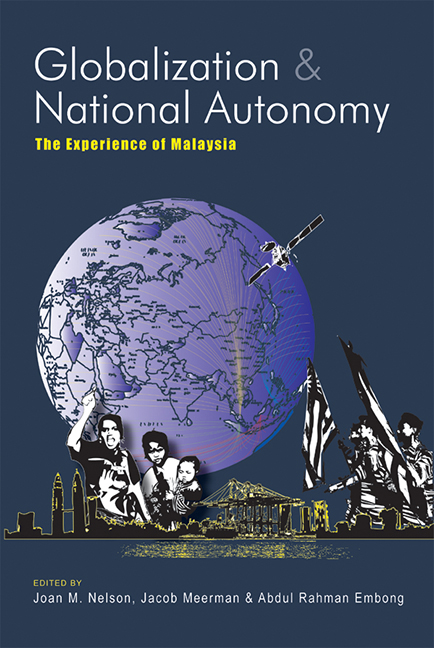Book contents
- Frontmatter
- Contents
- List of Abbreviations
- List of Tables and Figures
- Preface
- Contributors
- Chapter 1 Introduction
- Chapter 2 Developmentalist State in Malaysia: Its Origins, Nature, and Contemporary Transformation
- Chapter 3 The Look East Policy, the Asian Crisis, and State Autonomy
- Chapter 4 The Malaysian Success Story, the Public Sector, and Inter-ethnic Inequality
- Chapter 5 Poverty Eradication, Development, and Policy Space in Malaysia
- Chapter 6 Trade Liberalization and National Autonomy: Malaysia's Experience at the Multilateral and Bilateral Levels
- Chapter 7 Malaysia's Education Policies: Balancing Multiple Goals and Global Pressures
- Chapter 8 Malaysia's Healthcare Sector: Shifting Roles for Public and Private Provision
- Chapter 9 Globalization, Islamic Resurgence, and State Autonomy: The Response of the Malaysian State to ‘Islamic Globalization’
- Chapter 10 The National Culture Policy and Contestation over Malaysian Identity
- Chapter 11 Conclusions
- Index
Chapter 9 - Globalization, Islamic Resurgence, and State Autonomy: The Response of the Malaysian State to ‘Islamic Globalization’
Published online by Cambridge University Press: 21 October 2015
- Frontmatter
- Contents
- List of Abbreviations
- List of Tables and Figures
- Preface
- Contributors
- Chapter 1 Introduction
- Chapter 2 Developmentalist State in Malaysia: Its Origins, Nature, and Contemporary Transformation
- Chapter 3 The Look East Policy, the Asian Crisis, and State Autonomy
- Chapter 4 The Malaysian Success Story, the Public Sector, and Inter-ethnic Inequality
- Chapter 5 Poverty Eradication, Development, and Policy Space in Malaysia
- Chapter 6 Trade Liberalization and National Autonomy: Malaysia's Experience at the Multilateral and Bilateral Levels
- Chapter 7 Malaysia's Education Policies: Balancing Multiple Goals and Global Pressures
- Chapter 8 Malaysia's Healthcare Sector: Shifting Roles for Public and Private Provision
- Chapter 9 Globalization, Islamic Resurgence, and State Autonomy: The Response of the Malaysian State to ‘Islamic Globalization’
- Chapter 10 The National Culture Policy and Contestation over Malaysian Identity
- Chapter 11 Conclusions
- Index
Summary
INTRODUCTION
In recent years a vast scholarly literature has built up on the subject of globalization. Yet there is a dearth of literature on an important facet or dimension of the globalization process which, since the late 1970s, has also had great impact both on the trajectory of internal social and political developments in a number of countries, and on contemporary global politics. This is the process of globalization of the various religious forces and movements sometimes categorized and labelled as “religious fundamentalism”.
Foremost among these worldwide religious movements is the globalization of the various Islamic resurgent movements that have driven a process now commonly described as the Islamization of state and society, through a kind of politics that has asserted itself not only in the traditional Muslim world of the Middle East, parts of Africa and Asia, but also, recently and increasingly, in European and Western countries such as the United Kingdom, France, Germany, and the United States, where Muslim migrants are now sizeable minorities. The current global concern with the spread of terrorism is undeniably linked to this other dimension of globalization. This “Islamic globalization” (if we can call it by that name) has far broader, more penetrating implications, within many nations and in the international sphere as we shall see in this chapter.
This chapter examines the impact of such an Islamic globalization process in Malaysia, focusing mainly on the ramifications of the Islamization policies of the Malaysian government in the period of the Mahathir Administration (1981 to 2003). Taking the Malaysian experience as a case study, this essay describes how the globalization of various strands of Islamic resurgence movements of the 1970s–1980s has dominated political and social developments of a modernizing Muslim nation-state. Islamist movements in the Malaysian context have also largely determined the way in which the secular state shaped the course of nation building of a post-independent multi-religious country. The Islamization policies undertaken by the Malaysian government responded to the political pressure exerted by Islamist politics and resurgence movements that demand Muslim-majoritarian countries be governed by Islamic laws or shari'a if not by an “Islamic state” type of government. What an “Islamic state” entails is in itself a part of the contentious rhetoric, debate and political struggle of most Islamist contemporary movements.
- Type
- Chapter
- Information
- Globalization and National AutonomyThe Experience of Malaysia, pp. 241 - 272Publisher: ISEAS–Yusof Ishak InstitutePrint publication year: 2008

